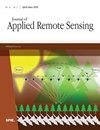Monitoring soil moisture in cotton fields with synthetic aperture radar and optical data in arid and semi-arid regions
IF 1.4
4区 地球科学
Q4 ENVIRONMENTAL SCIENCES
引用次数: 0
Abstract
Soil moisture is a key factor affecting the growth of crops, and microwave remote sensing is one of the most important methods for inverse studies of soil moisture in agricultural fields in recent years. Cotton is a typical water-demanding crop in arid zones, and accurate estimation of soil moisture information in cotton fields is extremely important for optimizing irrigation management, improving water use efficiency, and increasing cotton yield. This study focuses on extracting feature sets by combining Sentinel-1 and Gaofen-6 satellite data, constructing convolutional neural network (CNN), random forest, support vector regression, and eXtreme gradient boosting model to estimate the soil moisture in cotton fields in Shihezi area of Xinjiang, and designing eight groups of experiments according to the different input data sources. The experimental results show that the accuracy of the soil moisture estimate in cotton fields in arid areas with multi-source data is significantly better than that of a single data source. Moreover, the CNN was best estimated when using multi-source data feature sets as inputs, with a coefficient of determination of 0.789, a root mean square error of 0.0249 cm3/cm3, and an average absolute error of 0.0198 cm3/cm3 for its CNN model. This result demonstrates the effectiveness of CNN in soil moisture estimation and also provides a new method for the use of multi-source remote sensing data for accurate soil moisture estimation in cotton fields in arid areas, and also explores the application of Gaofen-6 data in soil moisture.利用合成孔径雷达和光学数据监测干旱和半干旱地区棉田的土壤湿度
土壤水分是影响农作物生长的关键因素,微波遥感是近年来反演农田土壤水分的重要方法之一。棉花是干旱地区典型的需水作物,准确估算棉田土壤水分信息对优化灌溉管理、提高用水效率和增加棉花产量极为重要。本研究主要通过结合哨兵一号和高分六号卫星数据提取特征集,构建卷积神经网络(CNN)、随机森林、支持向量回归和eXtreme梯度提升模型来估算新疆石河子地区棉田土壤水分,并根据不同的输入数据源设计了8组实验。实验结果表明,多源数据对干旱地区棉田土壤水分的估算精度明显优于单一数据源。此外,在使用多源数据特征集作为输入时,CNN 的估计效果最佳,其 CNN 模型的决定系数为 0.789,均方根误差为 0.0249 cm3/cm3,平均绝对误差为 0.0198 cm3/cm3。该结果证明了 CNN 在土壤水分估算中的有效性,也为利用多源遥感数据准确估算干旱地区棉田土壤水分提供了一种新方法,同时也探索了高分六号数据在土壤水分中的应用。
本文章由计算机程序翻译,如有差异,请以英文原文为准。
求助全文
约1分钟内获得全文
求助全文
来源期刊

Journal of Applied Remote Sensing
环境科学-成像科学与照相技术
CiteScore
3.40
自引率
11.80%
发文量
194
审稿时长
3 months
期刊介绍:
The Journal of Applied Remote Sensing is a peer-reviewed journal that optimizes the communication of concepts, information, and progress among the remote sensing community.
 求助内容:
求助内容: 应助结果提醒方式:
应助结果提醒方式:


